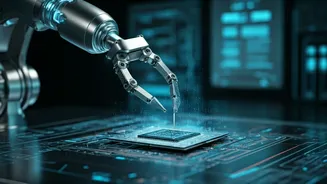AI's Transformative Influence
The tech world is witnessing a significant shift thanks to the integration of Artificial Intelligence (AI). AI's impact is not just incremental but truly
transformative, leading to the creation of novel job roles and the redefinition of existing ones. This transformation is driven by AI's capabilities in automating tasks, analyzing vast datasets, and making intelligent decisions. As AI systems become more sophisticated, their integration across various industries intensifies, creating both opportunities and challenges for tech professionals. Consequently, professionals must quickly learn to navigate this evolving landscape to remain relevant and competitive.
Emerging AI-First Roles
A wave of AI-first roles is sweeping through the tech sector, reflecting the industry's focus on harnessing AI's potential. These positions are specifically designed to develop, implement, and maintain AI-driven solutions. Key among these are AI engineers, who design and build AI systems; data scientists, who analyze data to extract insights and train AI models; and machine learning specialists, who focus on the algorithms that allow AI to learn from data. Moreover, roles related to AI ethics and governance are also emerging, reflecting a growing need to address ethical considerations and regulatory compliance in the development and deployment of AI technologies. These roles highlight the need for professionals with specialized knowledge and skills in AI.
Essential Skills for Success
Adapting to the AI-driven changes necessitates acquiring a new set of skills that are becoming increasingly valuable. Proficiency in programming languages like Python and R is crucial, as these are foundational for AI development. A strong understanding of machine learning algorithms, deep learning, and neural networks is also essential. Moreover, professionals will need to develop strong analytical and problem-solving skills to interpret data, identify patterns, and create effective solutions. The ability to work collaboratively, communicate complex ideas clearly, and adapt to constant change will also be important. Continuous learning and upskilling are not optional but essential to stay ahead in this dynamic field.
Impact on Traditional Roles
Traditional tech roles are also being reshaped by the influence of AI, with automation and AI-driven tools changing how work is done. For instance, software developers are now using AI-powered tools for code generation and debugging, while project managers leverage AI for task management and resource allocation. This means professionals in traditional roles need to expand their skillset to include AI-related competencies to enhance their productivity and efficiency. Those who learn how to effectively collaborate with AI tools are likely to be more successful. This shift stresses the necessity of integrating AI skills into existing job roles and underscores the need for adaptability within the tech workforce.
Preparing for the Future
To thrive in the age of AI, tech professionals should start strategizing for their future now. Education is paramount, encompassing advanced degrees and specialized certifications in AI and related fields. Practicing skills through real-world projects, participating in coding challenges, and contributing to open-source initiatives offers practical experience. Networking with AI experts, joining industry groups, and staying updated on the latest AI trends keeps professionals informed and connected. Considering the rapid evolution of this field, creating a proactive strategy to secure a successful career in AI is not just beneficial, but essential for future prosperity in the tech industry.












